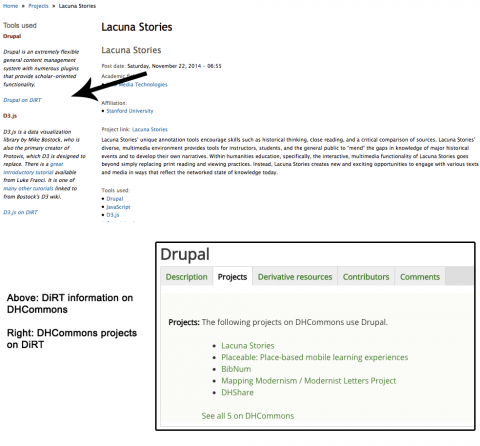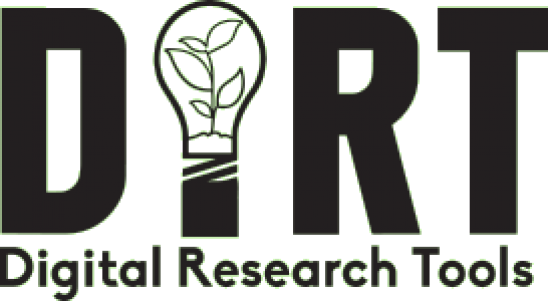The DiRT Directory is a registry of digital research tools that draws upon the efforts on an international community of volunteers. Over the last few months, the DiRT steering committee and editorial board, along with our partners at the City University of New York and the Agile Humanities Agency, have been hard at work finishing up a wide range of integrations and site improvements for DiRT. Development work has been conducted with the support of the Andrew W. Mellon Foundation. Read more detailed descriptions of the following new features and partnerships on the DiRT blog:
-
DiRT becomes a centerNet initiative
As a directory of tools for digital research, maintained by an international community of volunteers, DiRT will benefit from closer ties to centerNet’s member centers around the world, as well as to centerNet’s DHCommons project directory. -
DiRT integration with DHCommons
DiRT tool profiles now include links to projects that use that tool, drawn from the DHCommons project directory. This information is also reflected in DHCommons project profiles. (See image)

-
Spanish translation of DiRT in development
DiRT recently underwent a series of structural changes to enable the translation of its content by international teams of volunteers. Spanish translation efforts are led by Elena Gonzalez-Blanco of Digital Humanities Innovation Laboratory (LINHD) at the National Distance Education University (UNED) in Madrid and Gimena del Rio Riande the Argentine Center of Scientific and Technological Information of the National Scientific and Technical Research Council (CAICYT-CONICET). This work will pave the way for better multilingual support among other sites under the centerNet umbrella. -
Tool reviews on DiRT
The DiRT Directory is giving reviews a more prominent place on the on the site by providing a new tool review feature that allows users to publish more extensive reviews or point to reviews published elsewhere. -
DiRT offers API access, export options
The DiRT directory tool listings will now be available for analysis, incorporation into other websites, and creative reuse, via a new API and data export options. -
Add tools to DiRT by tweeting
Anyone can add a stub page to DiRT Directory by tweeting the tool name and URL at @dirtdirectory with the hashtag #dhtool. Stubs are added to the directory once more metadata has been filled in, either by DiRT editors or community volunteers. View available stubs on DiRT’s new “Twitter submissions” page. -
DiRT adds "Tool list" feature
Use DiRT’s new tool list feature to keep track of your favorite tools or curate a list for your community. Tool lists are available for export to CSV or JSON. -
DiRT adopts TaDiRAH terms, provides RDF data
The TaDiRAH taxonomy, jointly developed by members of DiRT’s steering committee and DARIAH-DE, is now the main organizing and browsing framework for DiRT. Tool profile information is also available using RDFa. See DiRT’s RDF documentation for information on the attributes and mappings. -
Bring DiRT into your classroom with our "assignment-in-a-box"
DiRT steering committee member Shawn Day has developed a tool review assignment that can be incorporated into digital humanities courses, and other digitally inflected curricula (e.g. digital literacy seminars, professional development workshops for librarians, etc.). This “assignment in a box” can be used as is, or can be freely modified to meet the particular needs of the course. It is currently available as a “beta” release; feedback on the assignment, both from instructors and from students, is welcome via our contact form. -
DiRT partners with TAPoR to provide "recipes"
The DiRT directory is happy to announce a partnership with the Text Analysis Portal for Research (TAPoR) that will involve, among other collaborations, a joint effort to further develop the Methods Commons (methodi.ca). The Methods Commons is a collection of “recipes”, or step-by-step guides to how to apply digital tools to scholarly problems. Many of these recipes illustrate how to use multiple tools together, which provides additional, helpful context for DiRT users exploring how they might incorporate particular tools into their project. -
DiRT plugin available for Commons In A Box (CBOX) Scholarly Network
A new plugin for the Commons In A Box (CBOX) scholarly networking platform brings DiRT’s tool listings directly to people in an environment where they can discuss digital tools and share their expertise and suggestions within trusted communities. The DiRT plugin is already available for individual group owners to enable on the CUNY Academic Commons, NYC Digital Humanities, and the Texas Digital Humanities Consortium.
